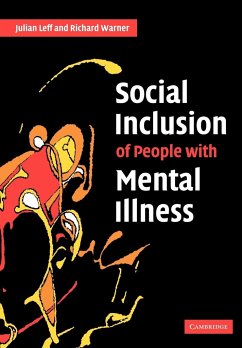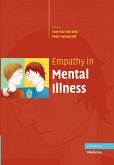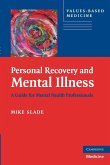This book discusses the reasons for the social exclusion of people with mental illness.
People with serious mental illness no longer spend years of their lives in psychiatric institutions. In developed countries, there has been a major shift in the focus of care from hospitals into the community. However, whilst it means those with mental illness are not confined, it does not guarantee they will be fully integrated into their communities. The barriers to full citizenship are partly due to the disabilities produced by their illnesses and partly by stigmatising and discriminatory attitudes of the public. This book analyses the causes of these barriers and suggests ways of dismantling them. The book is constructed in two parts: the first relates to social inclusion and the second to occupational inclusion. Throughout, the text is annotated with quotes from consumers, to illustrate their experience of the issues discussed. The innovations outlined are described in sufficient detail for the reader to implement them in their own practice.
Review quote:
'It covers in a comprehensive way the most important issues in the field. At the same time, it benefits from the authors' long-lasting clinical and research experience in mental health services -' Acta Psychiatrica Scandinavica
'This is an excellent small book containing essential but rarely available information for psychiatrists and for all mental health stakeholders including service users and families - it combines a discussion of important psycho-social deterimants of the disorders with well tested programs aimed at reducing their adverse impact and facilitate the full social integration of the service user. Beyond the description of facts arising from hard data, and not mere impressions, what is outstanding throughout the book is the repeated presence of themes and concepts that reinstate human rights values into a psychiatric practice that has pivoted around the power of the clinician and disempowered the user -this book suits the needs of all mental health stakeholders. For a psychiatric resident it is, simply, a must.' Israel Journal of Psychiatry Related Sciences
Table of contents:
Foreword; 1. Introduction: Barriers to social and occupational integration; 2. The course of psychoses; 3. The nature of stigma; 4. Poverty and social disadvantage; 5. Ameliorating users' symptoms; 6. Dismantling psychiatric institutions; 7. Reducing fear and discrimination among the public; 8. Tackling self-stigmatisation; 9. Overcoming obstacles to employment; 10. Economic obstacles to employment; 11. The spectrum of work programmes; 12. Social firms; 13. Innovative strategies; 14. Inclusion and empowerment of consumers.
People with serious mental illness no longer spend years of their lives in psychiatric institutions. In developed countries, there has been a major shift in the focus of care from hospitals into the community. However, whilst it means those with mental illness are not confined, it does not guarantee they will be fully integrated into their communities. The barriers to full citizenship are partly due to the disabilities produced by their illnesses and partly by stigmatising and discriminatory attitudes of the public. This book analyses the causes of these barriers and suggests ways of dismantling them. The book is constructed in two parts: the first relates to social inclusion and the second to occupational inclusion. Throughout, the text is annotated with quotes from consumers, to illustrate their experience of the issues discussed. The innovations outlined are described in sufficient detail for the reader to implement them in their own practice.
Review quote:
'It covers in a comprehensive way the most important issues in the field. At the same time, it benefits from the authors' long-lasting clinical and research experience in mental health services -' Acta Psychiatrica Scandinavica
'This is an excellent small book containing essential but rarely available information for psychiatrists and for all mental health stakeholders including service users and families - it combines a discussion of important psycho-social deterimants of the disorders with well tested programs aimed at reducing their adverse impact and facilitate the full social integration of the service user. Beyond the description of facts arising from hard data, and not mere impressions, what is outstanding throughout the book is the repeated presence of themes and concepts that reinstate human rights values into a psychiatric practice that has pivoted around the power of the clinician and disempowered the user -this book suits the needs of all mental health stakeholders. For a psychiatric resident it is, simply, a must.' Israel Journal of Psychiatry Related Sciences
Table of contents:
Foreword; 1. Introduction: Barriers to social and occupational integration; 2. The course of psychoses; 3. The nature of stigma; 4. Poverty and social disadvantage; 5. Ameliorating users' symptoms; 6. Dismantling psychiatric institutions; 7. Reducing fear and discrimination among the public; 8. Tackling self-stigmatisation; 9. Overcoming obstacles to employment; 10. Economic obstacles to employment; 11. The spectrum of work programmes; 12. Social firms; 13. Innovative strategies; 14. Inclusion and empowerment of consumers.








